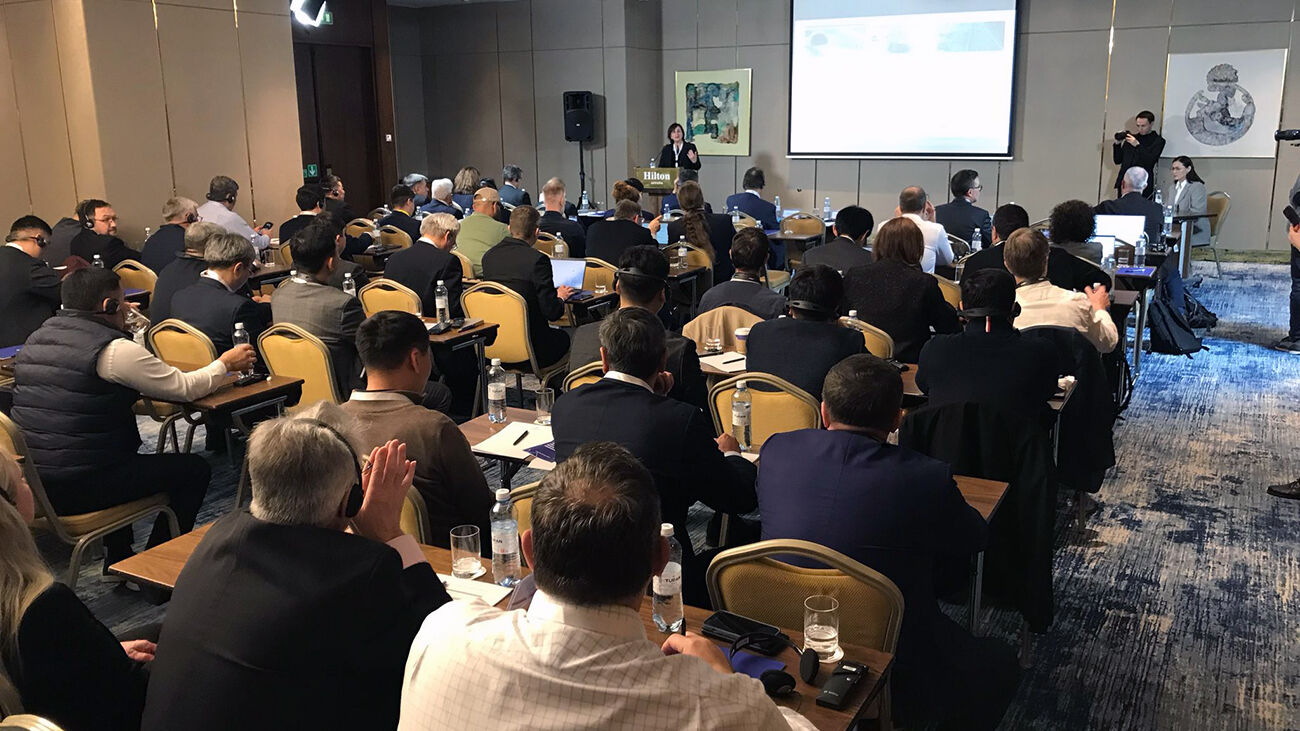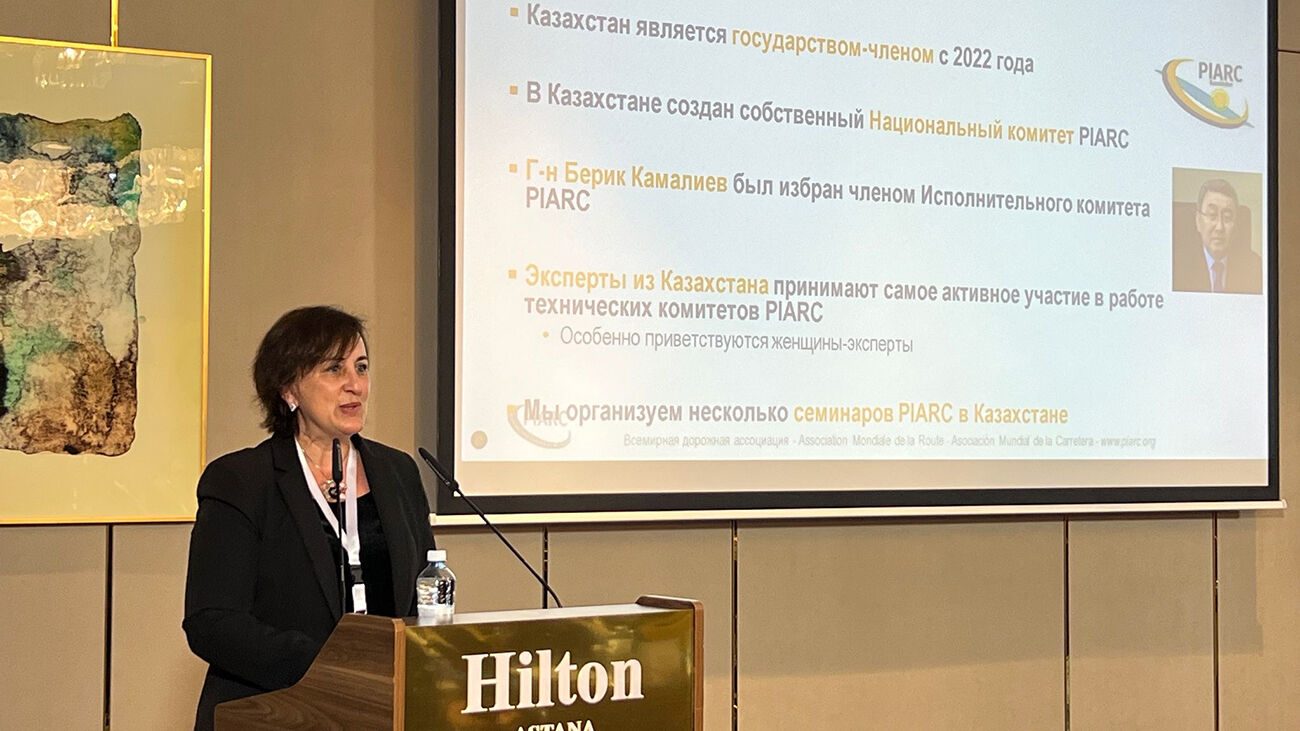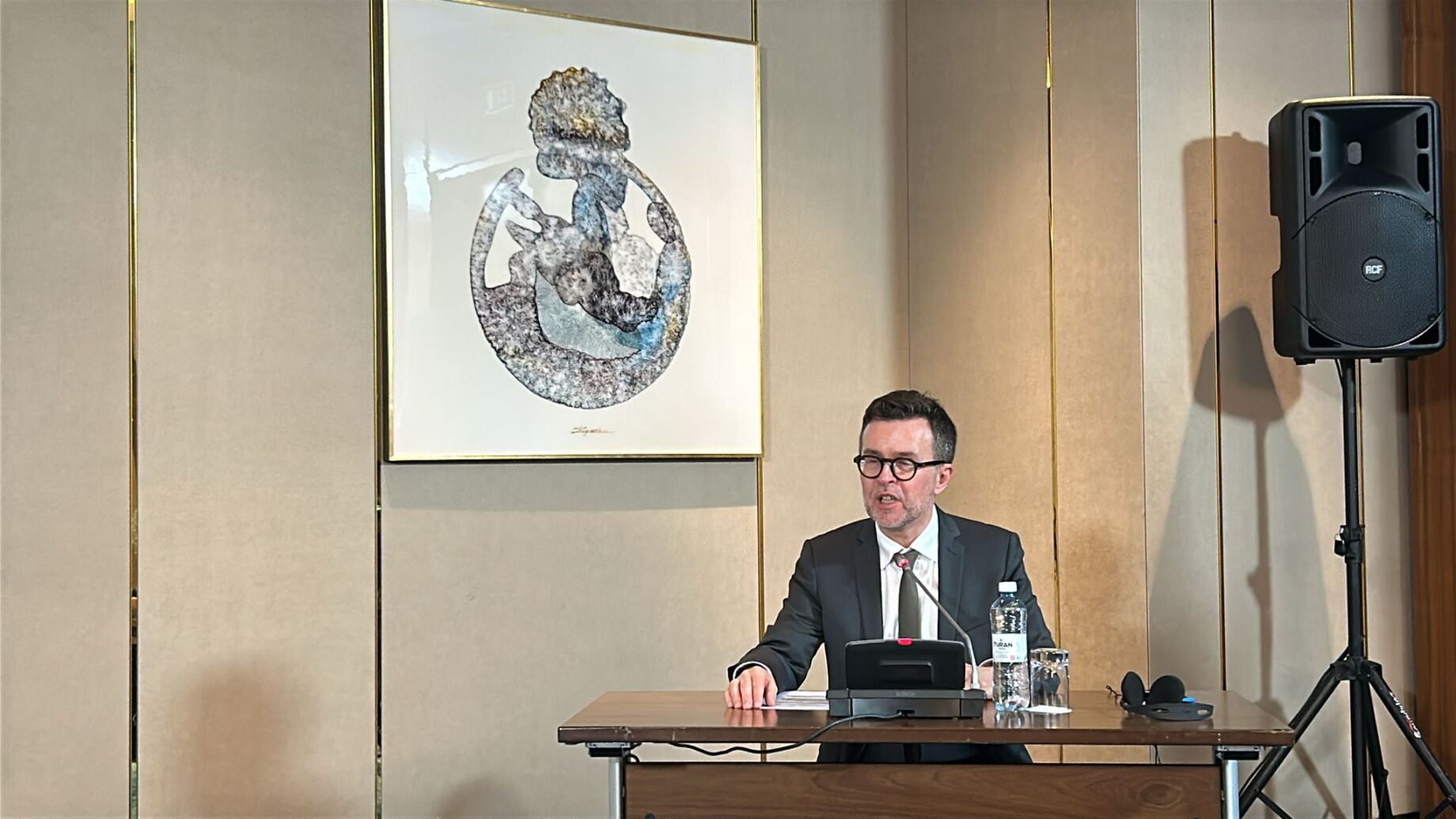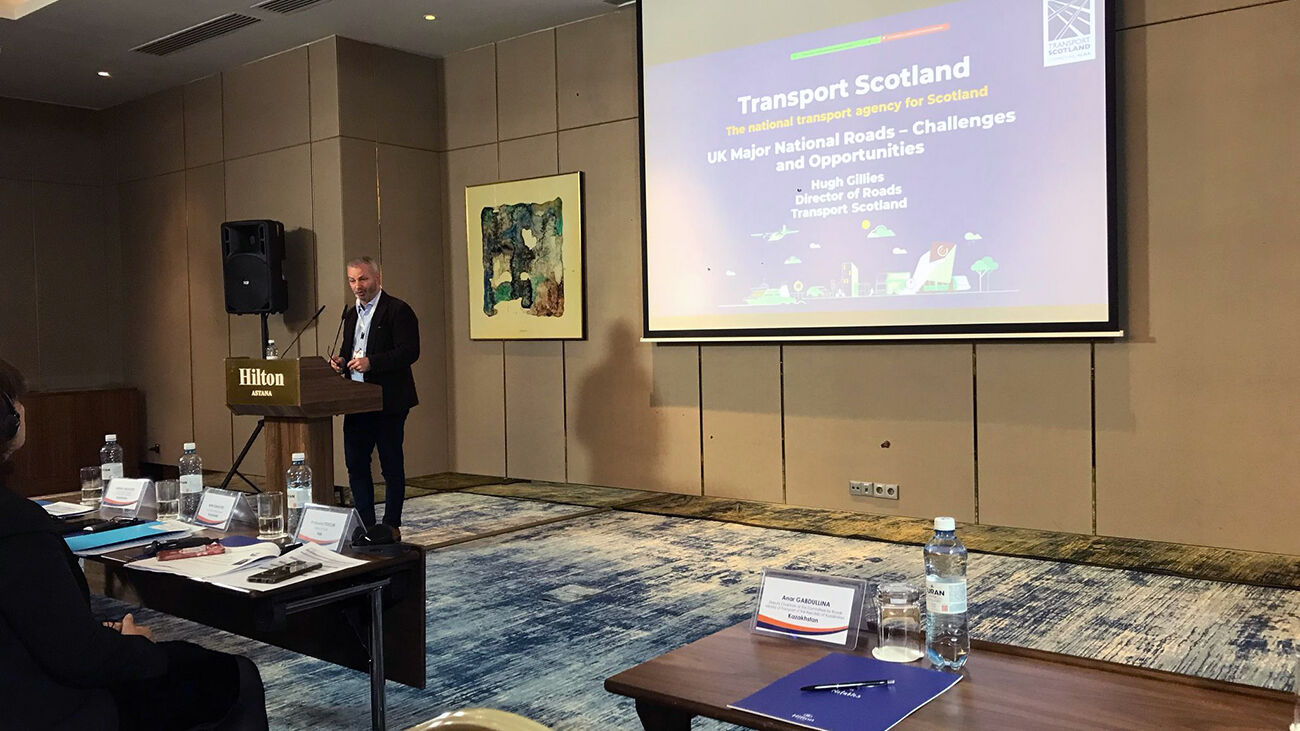International Seminar "Road Winter Service Practices Innovation Extreme Weather Conditions"
09-10 April 2025, Astana (Kazakhstan)
The International Seminar, held from April 09 to 10, 2025 at the Hilton Hotel in the Exhibition Center EXPO in Astana, was organized jointly by the Ministry of Transport of the Republif of Kazakhstan, PIARC's Kazakh national committee and the Technical Committee 3.2 "Winter Service" of PIARC.
Preparatory documents for the Seminar
Quick recap
The seminar discussed various aspects of road maintenance in Kazakhstan, including winter conditions, road safety measures, and the introduction of toll roads. PIARC presented on the importance of knowledge exchange, the role of the World Road Association, and the challenges faced by the road sector. The presentations covered innovations and challenges in winter road maintenance, funding and road administration in Kazakhstan and around the world.
The seminar was opened by the Kazakh vice minister of transportation, the PIARC President and the Chair of PIARCS winter service committee.
Summary
Opening and Keynotes
In the meeting, PIARC discussed the technical aspects of their road project, including the design speed, permissible speed, and the use of Intelligent Transport Systems (ITPS). They also highlighted the importance of traffic safety and the use of variable message signs to transfer information to road users. PIARC also mentioned the use of meteorological data to take preventive measures during winter maintenance.
PIARC discussed the importance of knowledge exchange and the role of the World Road Association in facilitating this. They highlighted the association's non-profit and non-political nature, its global reach, and its focus on road transportation. PIARC also mentioned the upcoming 17th edition of the World Winter Service and Road Resilience Congress, to be held in France, and the conclusion of the working cycle 2024 to 2027 in Vancouver, Canada. The meeting also touched on the strategic plan for 4 years, with a focus on safety and society. PIARC expressed gratitude to Kazakhstan for their hospitality and for being a member of the association since 2022. The conversation ended with a discussion on the challenges faced by the road sector, including climate change, extreme weather events, and road safety.
Road maintenance in Kazakhstan, focusing on winter conditions and road safety measures were presented. Kazakhstan has 95,000 km of roads, with 25,000 km being international and national roads. The country faces challenges with snow-covered and icy roads in winter, sometimes requiring road closures for up to 10 days. To address this, they implement measures such as installing snow fences, using portable wooden shields, and coordinating with various government agencies. The country is also introducing toll roads to increase funding for maintenance. Road safety remains a concern, with about 3,000 accidents annually resulting in over 1,000 fatalities. To improve safety, they are implementing measures such as expanding roads from two to four lanes, building pedestrian overpasses, and installing animal fencing. They have also recently introduced average speed enforcement on toll roads.
The Quebec Ministry of Transportation presented their efforts in reducing the environmental impact of road salts, including the development of winter ecoroads and roadside windbreaks. They also introduced a system for automatic detection of visibility loss and a pilot project for a wide-wing snowplow system.
The Japanese government shared their resilience framework and plans to strengthen infrastructure, including the completion of trunk road networks and the prevention of deterioration.
The Indian government presented a case study of the challenges faced in building roads in the Himalayas, including unstable hill slopes, flash floods, and snow avalanches. They also discussed innovative methods adopted for slope protection, such as the use of cementitious subbases and the use of waste materials like plastic and still slag.
Session 1 – Winter maintenance in roads and urban areas and new technologies
In the meeting, PIARC discussed various topics related to road administration and funding. The discussion covered the funding certainty for road administrations, the presentation of a 5-year plan for national resilience, and the importance of resilience in road operations. The meeting also touched upon the use of technology in road operations, including intelligent transport systems and the potential of artificial intelligence in winter maintenance.
The Innovations Challenge hosted by MoDOT promotes a culture of innovation within the department and from external. Recognition prices and the opportunity to patent items gives incentives to come up with ideas. Recent innovations that became practical tools were a tow plow and beet juice to supplement sodium chloride treatments. SICOP Talks Winter Ops is a podcast promoting winter service to a wide public.
Ayman Janzakow presents on Kazakhstan's first PPP concession project for road construction and maintenance. The project involves a 20-year concession agreement with 50 months allocated for construction, though it was completed in just 32 months. The project is unique as it incorporates an intelligent transport payment system from the start, unlike other Kazakh roads that are tolled after construction. It is funded by foreign investors and involves multiple stakeholders, including international banks and Korean companies. The project's structure is complex, with the Republic of Kazakhstan as the grantor and a consortium of four companies handling construction and maintenance.
The actual development of winter service on Austrian highways showed the climate change in alpine regions and methods to keep highways safe. The number of hoarfrost days is increasing while snowfall is going down. Hoarfrost is difficult for costumers to recognize therefore fast treatment is very important. New weather models combined with the use of brine only makes it possible to fulfil expectations.
Session 2 – Procurement and contract for winter sevices
There are already differentiated recommendations for sizing spreading material storage capacities for winter road service. However, a systematic evaluation of storage concepts—such as halls and silos—across their full life cycle with regard to operational and economic aspects is still lacking. Sample solutions have been developed based on different operating conditions.
For main operation centers, salt storage should take place in covered halls. For satellite depots, silos with capacities of up to 500 tons are recommended. Typically, dry salt and brine should be loadable in parallel at a minimum of two locations. For ergonomic and operational reasons, loading areas in hall storage should be weather-protected. A height offset of about 1.50 meters between the winter service vehicle and the wheel loader’s maneuvering level is advisable. If brine is filled using a wheel loader, the production system should be located inside the gritting hall. As an alternative to a traditional hall gate, a partially open front with a canopy and sufficient space in front of the storage area can also be effective.
An overview was also provided of winter maintenance contracts on Polish national roads. Of Poland’s 27,000 km of public roads, 4% are national roads managed by the General Directorate for National Roads and Motorways. The highway network has expanded from 500 km in 2002 to over 5,200 km today. Two types of contracts are used: dispersed contracts for individual services and aggregated contracts covering full maintenance areas. Aggregated contracts—typically lasting four years and covering around 175 km—are preferred. Contractors must monitor conditions 24/7, provide equipment and materials, and meet service standards.
In Vienna, Austria, two contract types are used. Private contracts for roads are activated only during peak demand (e.g. heavy snow). Pavement and bike path services are managed independently. To minimize salt use, brine is applied citywide. Effective ploughing—using double-bladed ploughs—is key to reducing salt needs.
Session 3 – Climate change and winter service
In this paper, we consider the problem associated with the fight against slipperiness on roads with a hard type of road surface. It is known that on cement-concrete surfaces, the length of the braking distance is up to 10 times longer than on a snow roll formed on asphalt-concrete surfaces. This phenomenon is especially dangerous in winter, as a sharp increase in humidity (as a result of warming) significantly reduces the strength properties of cement concrete. Chloride de-icers are highly hygroscopic. Being in the pores of cement concrete, chemical solutions begin to absorb moisture from the atmosphere. In asphalt concrete, such phenomena are practically absent. Moisture, which is located in the pores of cement concrete, on its surface occurs "staining" and peeling. In the article, the authors pay special attention to the climatic conditions of Kazakhstan. It is climate factors that make it difficult to use chemical reagents as anti-icing materials on roads with a cement-concrete surface.
This article discusses the theoretical basis for the destruction of the crystal structure of snow and ice formations from the influence of chemical reagents. They established a natural dependence of the freezing force of snow and ice formations on the impact of various types of salt solutions. Also, laboratory studies have established the effect of the concentration of salt solutions on the loss of strength of cement concrete over time.
Changes in climate over the last 20 years and how it is expected to change in the future and effects on winter service have been presented. They presented data from 750 road weather stations in Sweden, focusing on the southern and northern parts of the country. The data showed that air and road surface temperatures have increased, while precipitation and snow have decreased in the southern part. However, the northern part is expected to experience more precipitation and snow in the future. The team also discussed the need for more preventative actions in the northern part and fewer in the southern part. They concluded by emphasizing the importance of understanding the current weather and climate trends to prepare for future changes.
KazdorNII presented upcoming changes to their digital platform, a unified base of road construction materials and new technologies. The platform offers an interactive map of quarries and asphalt plants, a register of new technologies, a list of accredited laboratories, a catalogue of specialized equipment, and a register of cement and mineral powder manufacturers. The platform also includes a technical means of road safety and a register of accredited laboratories.
Extreme low temperatures make different approaches in winter service necessary. One solution is a new sanding method, warm-wetted sanding, which is widely used in Norway and provides higher friction and longer durability. The method is expected to be affected by climate change.
Session 4 – Decarbonisation and sustainable winter services
KazdorNII presented QSmart, new developments of the Institute for Winter Maintenance and Road Safety. Q SMART-K catalyst is designed to strengthen sand and gravel mixtures and prevent erosion of roads from ground water. And the modified mineral powder Q SMART-MP-1, made on the basis of pulverized fuel ash, increases the durability of asphalt concrete and, at the same time, offers an effective tool for solving economic and environmental challenges.
The preferential supplying site of the evian hydromineral deposit is recognised as being of international importance and is protected from chlorides through a framework agreement on the environmental control of road maintenance in winter. The Association de Protection de l'Impluvium de L'Eau Minérale evian (APIEME), is experimenting and implementing a programme of actions in partnership with the Department of Haute-Savoie and the 13 APIEME member municipalities. The territory is located in the French Alps on the shores of Lake Geneva. The harshness of winter is very heterogeneous, ranging from "rigorous" in the highlands with the presence of ski resorts, to "clement" on the shores of the lake, the latter exerting a strong influence. In order to continue the dynamic begun several years ago, Cerema (French center for Studies and Expertise on Risks, Environment, Mobility and Development) has been commissioned to support the APIEME municipalities by proposing action plans to be implemented in the short and long term to reduce the spreading of sodium chloride. In 2021, an inventory of the situation and an action plan have been drawn up for the rural municipalities in the infiltration zone, and then in 2022 for the more urbanised municipalities where evian natural mineral water emerges. The action strategy aims to strengthen the links between users, elected officials and technical services based on the strengths and points of progress identified.
Innovative, sustainable products and systems for winter road maintenance from Italy have been presented. Starting with an electric spreader that is perfect for the use on electric vehicles. But it also makes savings possible on common Diesel trucks due to the higher efficiency compared to a hydraulic system. Ploughs with direct brine injection inside the cutting edge were presented as well as a telescopic plough with the ability to plough 7m wide at once.
Abrasives have been used for a long time and quite frequently for winter service, however the materials and practices are very diverse and there are currently no reference documents in France. The poor environmental connotation of salt means that road operators regularly ask themselves the question of finding an alternative to salting. The use of abrasives is one such alternative, provided that a balance is found between cost, environmental impact and safety. Some road managers having requested assistance on projects involving the use of abrasives on part of their road network and the use of alternative materials in place of "natural" materials, prompted the choice of Cerema (French Center for Studies and Expertise on Risk, Environment, Mobility and Development) to prepare reference documents on this topic. Natural abrasives are considered to be products derived from ballast, gravel pits or quarries, and alternative materials are those made from unpolluted waste and intended to be used alone or in a mixture, for road treatment techniques in winter.
| International Seminar Proceedings - 09-10 April 2025 Road Winter Service Practices Innovation Extreme Weather Conditions |
|---|
Day 1 - April 09
09:00 - 09:30 | Opening session
| |
09:30 - 11:00 | Keynote introductory session
| |
11:00 - 11:30 | Coffee break | |
11:30 - 13:00 | Session 1: Winter maintenance in roads and urban areas and new technologies
| |
13:00 - 14:00 | Lunch break | |
14:00 - 15:30 | Session 2: Procurement and contract for winter services
| |
15:30 - 16:00 | Coffee break | |
16:00 - 17:30 | Session 3: Climate change and winter services
| |
17:30 - 17:35 | Closing session
| |
19:00 | Seminar Dinner for ExCom and TC members | |
Day 2 - April 10
09:00 - 10:30 | Session 4: Decarbonization and sustainable winter services
| |
10:30 - 12:00 | Panel Discussion: De-Icing practices, methods and considerations
Panelists:
| |
12:00 - 12:30 | Closing Remarks
| |
12:30 - 13:30 | Lunch break | |
13:30 - 17:00 | Technical Visit | |



